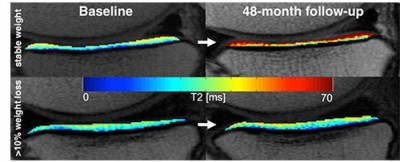MRI shows that weight loss can slow cartilage degeneration in obese and overweight patients, according to a study presented at the annual meeting of the Radiological Society of North America (RSNA).
Researchers from the University of California in San Francisco investigated the association of weight loss and the progression of knee cartilage degeneration in patients who are overweight or obese.
The study included 290 patients with a BMI of 25 kg/m2 or higher, recruited from the Osteoarthritis Initiative (OAI). All patients had risk factors for osteoarthritis (OA) or radiographically mild to moderate OA. Median age was 61.7; 171 were women.
“Degenerative joint disease is a major cause of pain and disability in our population, and obesity is a significant risk factor,” lead author Alexandra Gersing, MD, said in a release. “Once cartilage is lost in osteoarthritis, the disease cannot be reversed.”
The subjects all underwent knee MRI and were categorized as having experienced a large weight loss (more than 10%) or moderate loss (5%–10%) over 48 months. They were frequency matched to a group with stable weight. There were 36 patients in the large weight loss group and 109 in the moderate loss group.
The results demonstrated that overall cartilage Whole-Organ Magnetic Resonance Imaging Score (WORMS) showed significantly less progression in both weight loss groups compared to the stable weight group over the 48 months. “Cartilage degenerated a lot slower in the group that lost more than 10 percent of their body weight, especially in the weight-bearing regions of the knee,” Gersing said in the release. “However, those with 5 to 10 percent weight loss had almost no difference in cartilage degeneration compared to those who didn’t lose weight.”
The researchers plan to perform an eight-year follow-up to assess the effects weight gain may have on the knee joint.

Leave a Reply